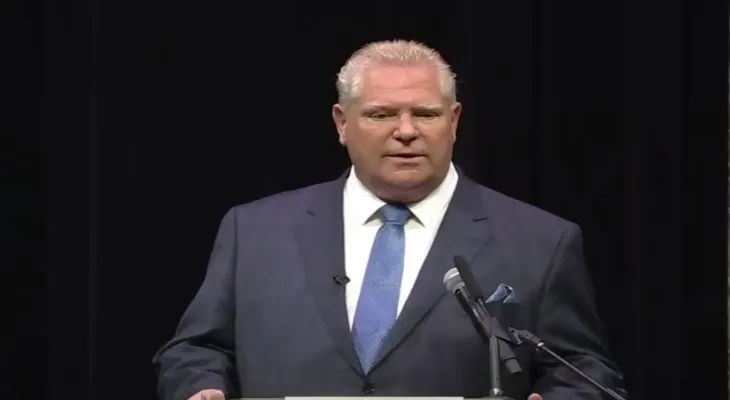Search here
Newspaper
Search here

Arab Canada News
News

Published: June 3, 2022
After hours of delivering a second majority government, which is larger than his first government, Ontario Premier Doug Ford sent a message calling for "unity together" addressing new and old supporters, as well as those who do not support him at all.
The Progressive Conservative Party won 83 out of 124 seats in the legislature in Thursday's election, but voter turnout reached a record low at 43 percent. The Conservatives won about 41 percent of those votes.
Ford said he will spend the next four years working with all Ontario residents.
He added: "The first message I want to say is, it's time for unity."
"We want to make sure we unite this province. We want to move forward; we are not against the people on the street even if they didn't vote for us."
Ford will now have to name a new government, reintroduce the budget, and pass it, but he said he was in no hurry.
He said, "We will take our time and sit with our party team. We have a big responsibility to keep our promises and we will make sure we fulfill every promise."
Ford said he will reintroduce a budget "almost matching" the unprecedented budget that served as his party's election platform, except for some minor amendments. The Conservatives campaigned on raising disability support payment rates, a pledge that was not in the budget until just a few weeks ago.
Meanwhile, both the NDP and Liberals will have to start the task of finding new leaders, as Thursday evening also witnessed the resignation of both Andrea Horwath and Steven Del Duca.
The New Democratic Party again formed the official opposition, with 31 seats, while the Liberals failed to qualify for the election for the second consecutive time with only eight seats.
Marit Stiles, who served as the NDP's education critic during the previous government and was re-elected in her leadership of Davenport, said she is open to the idea of trying for leadership.
But for now, she said she needs to connect with colleagues to listen to their vision for the party's future and how the NDP will position itself to win within four years.
She said, "I think we have a lot of work to do and we are definitely mourning some losses at the moment."
"Of course, the election results are disappointing, especially regarding the Conservative majority, but also the fact that 61 percent of Ontario residents were not a source of votes at all, and within the NDP, we have a great responsibility to understand and chart a really strong path forward."
The party says it will move quickly to select an interim leader.
Peter Graefe, assistant professor of political science at McMaster University, said whoever leads the Ontario NDP next will have to find a way to better appeal to Ontarians, but first, they must gain recognition.
He said, “First, you have to make Ontarians know you.” “And that will take some time, I think.”
On the other hand, the Liberals will look for a leader who can present a new image for the party.
Chris Cochrane, assistant professor of political science at the University of Toronto Scarborough, said the real defeat for the Liberals in this election is that they are not in a better position than they were four years ago.
He said the biggest challenge they face is to reintroduce themselves as a party that can form the government.
He added, "They have a real and tough battle."
"They not only have to hope the Conservatives might stumble, but they also have to hope that the party's voters turn to replace them, and it's not clear that will be the case."
Wayne Petrozzi, professor of political science at Toronto Metropolitan University, said the government "will have an 'absolute hand'" for the coming year as the Liberals and New Democrats look to fill the leadership voids.
As political discussions continue, Petrozzi said voters who largely did not engage in the campaign or the issues raised are likely to go on with their lives and focus on other things.
Editing: Dima Abu Khair
Comments